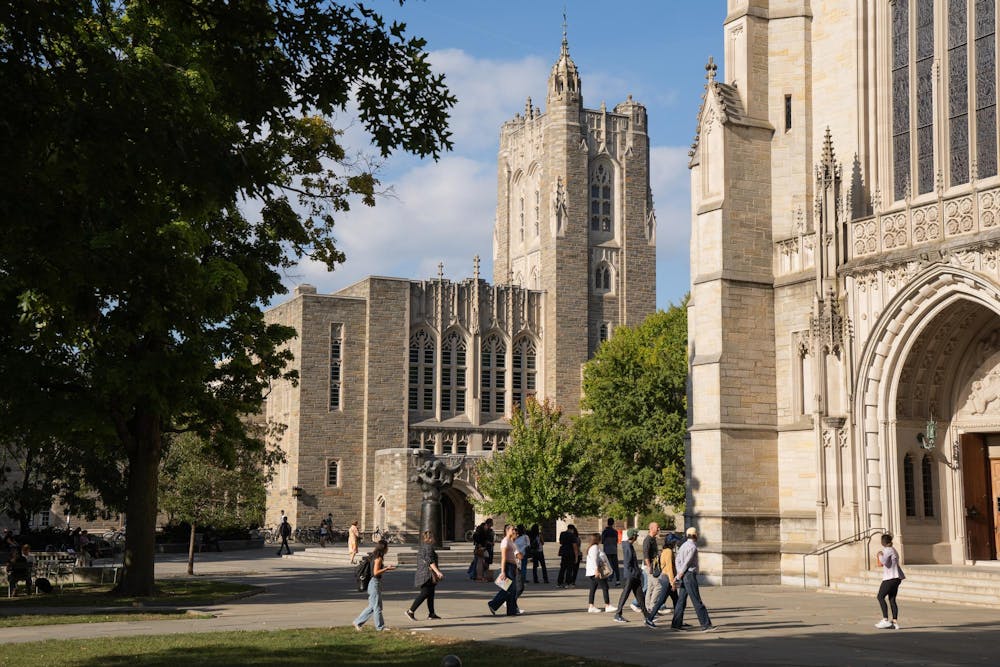If you made it to Princeton, chances are you spent a lot of time on your extracurriculars in high school.
By the time you clicked “submit” on your application, you might have already founded a nonprofit, become a state champion in a sport or three, or won gold medals at international STEM olympiads. And you wouldn’t be alone in those impressive achievements. According to Dean of Admissions and Financial Aid Karen Richardson ’93, about 18,000 unsuccessful Princeton applicants, or around half of those who apply in a given year, are just as qualified to attend as those who snag the coveted spots in an incoming class. That information probably confirms your intuitions: As grade inflation skyrockets in American high schools, we all know that being book smart is only a fraction of the admissions picture.
This hyper-competitive environment, in which the need to distinguish yourself fuels an extracurricular rat race, might produce a sense that extracurriculars aren’t just what make you special, they’re what make you whole.
But this mindset is corrosive to Princeton’s intellectual landscape. Just as academic success alone isn’t enough to get you into Princeton, you might feel like it’s not enough to make you a stellar Princetonian. Business may start to seem like a form of social cache. In a phenomenon that has been covered by both The Daily Princetonian and our peer institutions’ student papers, it might seem like people are performatively emphasizing the density of their obligations.
But when you run into a friend at Frist who breathlessly describes racing from investment club meeting to dance group rehearsal to debate practice and all you’ve got on the agenda for the afternoon is actually doing your readings, I encourage you to resist the temptation to devalue your academic work, or to prove yourself as a productive or “busy” Princeton student with a catalog of commitments outside of your classes. Princeton’s mission is primarily educational — it’s okay to prioritize your education.
I’m grateful to have found such fulfilling extracurriculars at Princeton. For instance, the ‘Prince’ allows me to contribute to campus dialogue beyond what’s possible in the classroom and hone real-world journalistic skills. But since I’m not willing to compromise (that much) on my health or time with friends, if I’d joined one more club, I wouldn’t have had time to do readings that have shaped my principles and my career aspirations. I wouldn’t have had time to polish a paper that sparked a connection with a professor who became a mentor. I wouldn’t have had time to curl up in a Murray-Dodge armchair and spend hours revising poems that I was proud to submit for a creative writing class.
Extracurriculars that you find fun and meaningful will be highlights of your Princeton experience, and will likely introduce you to some of your closest friends. But you don’t have to cram your schedule with clubs just because it’s what you did in high school, or because it seems like everyone else is doing it — especially not if it comes at the expense of deeply engaging with course content that is probably more interesting and challenging than anything you’ve encountered before.
The idea that you should spend time on school while at school has become increasingly contested — even radical. Silicon Valley magnates like Peter Thiel (who has both undergraduate and graduate degrees from Stanford) are actively trying to incentivize students to drop out of college and skip straight to founding start-ups. In some corners of the tech world, passing up on the immersive academic experience that college offers has become a status symbol.

But college is more than a utilitarian conduit to a lucrative career. As the federal government strips funds from universities, the presence of students who are devoted to their intellectual enrichment above extracurriculars or pre-professionalism reaffirms the enduring value of higher education.
Even if your personal intellectual projects don’t confer external validation or translate as neatly to a resume, they’re not worth sacrificing on the extracurricular chopping block. And when you become an upperclassman, your independent work — another academic experience that is unique to Princeton — will enable you to work one-on-one with a faculty member and maybe even travel the world on Princeton’s dime to explore what fascinates you.
As high school academic overachievers, we paradoxically internalize that our academic success isn’t enough, that we somehow have to do more. But at Princeton, intellectual labor isn’t tangential — it’s the whole point. Here, your studies transcend your GPA. As you delve into specific passions you may not have had the chance to explore in high school, it’s perfectly commendable to make your academics a more central part of your identity than they’ve ever been before.
Finding your ideal path through Princeton will take some trial and error. But at the best university in the country, it’s both acceptable and admirable to be a student first.

Head Opinion Editor Frances Brogan is a junior in the History department from Lancaster, Pa. She can be reached at frances.brogan@princeton.edu.








